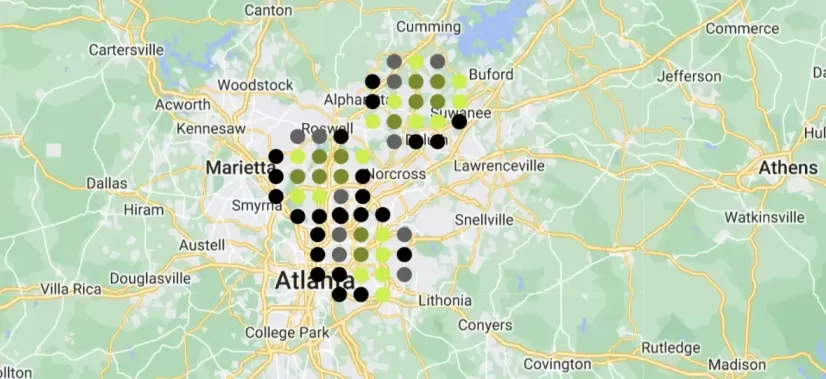We recently shared a potential solution for one of the biggest hurdles in on-page SEO: how to perform an internal linking analysis at scale. If you haven’t read it, we outlined our process for using the omniscient toddler that is ChatGPT to build an internal linking tool capable of crawling thousands of pages in search of internal linking opportunities based on your ranking keywords.
This is great for enhanced keyword visibility, better UX, and improved search engine understanding of the relationships between pages. But modern SEO strategies don't exist in a vacuum. They're built in pursuit of higher rankings and more SERP real estate within a competitive playing field. Clients need competitor insights too.
These curiosities are second to none. And when our clients aren’t thinking about how to advance their own marketing programs, they want to know how competitors’ programs are evolving. They want to know what they’re up to, where they’re outranking others, or pulling greater share-of-voice. In no place is this more evident than among clients and analysts focused on local SEO.
Improve Your Local SEO Strategy With Better Competitive Insights
As analysts, we know that our job comes down to improving visibility, ranking higher, and bringing in more conversions. The other side of that coin is understanding how and where competitors in our client’s backyard are outperforming them and what we can do to reverse those trends.
Good digital marketers know local SEO best practices. We’re sure to check and double-check those boxes. We stay up-to-date with the help of experts like Marie Haynes and Brightlocal, and stay mindful of banana peels in the road in the form of algorithm updates. But that’s the easy part.
The more difficult task is garnering data that helps paint a more comprehensive picture of the competitive landscape. For clients and analysts focused on local SEO, we needed better, accessible competitive insights. So we got to brainstorming.
Indeed, this is another tool-building story. One that further strengthens our commitment to embracing the movement toward AI and leveraging it to bring our clients sharper insights and faster results. But instead of wielding an ambition to solve an industry-wide problem, we focused on local performance insights.

Building a Local Rankings Analysis Tool with ChatGPT
We recently developed a local ranking analysis tool capable of taking any locally-based search query, like “dentist near me” or “commercial movers in raleigh”, and a set of coordinates to get a quick glance at how our clients stack up against competitors - as illustrated in the image above.
If you’re in the local SEO game, you’ll know this isn’t a novel idea. Tools like this already exist, but we wanted to build something that would allow a little more flexibility and greater accessibility. Here’s what we wanted:
Ease of use across departments (think sales and new business development, organic, and paid media)
Full control of when and how often we choose to run analyses
The ability to perform an analysis in one-off scenarios, without the constraints of subscription commitments
Minimal overhead
Developed through an iterative collaboration with OpenAI’s ChatGPT, we’ve built a Python-based web application that incorporates data retrieval from the Google Places API. Much like the internal linking tool, it was only through ongoing discussions, relentless testing, and an equivalent amount of GPT-jostling that we were able to break through to reliability.
How the Local Rankings Tool Works
Required user input includes a set of coordinates (up to five sets of coordinates may be entered per analysis) and a single target keyword. These inputs guide the tool in performing the relevant query and location-based, map results analysis.
For each set of user-entered coordinates, the program calculates twenty surrounding coordinates approximately equidistant from one another, in a cross-styled pattern, like this:
Example illustration of generated surrounding coordinates
The tool then taps the Places API to retrieve local search results from the specified coordinate location(s). That means for each set of user-submitted coordinates, the application makes twenty-one API calls using the target keyword and each set of coordinates. Then, as an indication of organic rankings, the tool simply fetches the first ten company names in the results.
Along with the logic to generate twenty surrounding sets of coordinates, we also wanted to make sure the output included those sets of coordinates, colors to indicate general ranking performance, and the specific rankings results. Upon completion, the data is then kicked out to a newly created Excel spreadsheet, like this:
Example output from the query, “bakery”
Outputting to an Excel spreadsheet gives us the flexibility to do what we please with the data, including integrating it with Looker (previously Google Data Studio). That means business development can use it for pitches and analysts can incorporate it into monthly reporting or use it for their competitor research deliverables.
Using the Local Rankings Tool to Improve Local SEO Strategy
Beyond providing insights into who your competitors are and how they’re performing, or simply conducting a manual search and getting results limited by where you physically are, we now have a scalable solution to check on performance when searching from any specified location.
Want to see how your Brooklyn-based pizza shop is ranking from a specific bench in Prospect Park? Or maybe you’d like to know how your law firm ranks when searched from the ten courthouses closest to your practice. With this new AI-backed tool, all of this (and more) is possible.
Being able to specify a precise set of coordinates, you can get as granular as you want. And if your business has rankings all over the country, there’s no limit to which or how many markets and locations you can analyze.
Having these kinds of insights, especially when performed at a recurring cadence, provides greater visibility into which geographic areas demand greater attention. Our digital marketing analysts fold this intelligence into Local SEO strategies and tactics that save us and our clients time and resources in pursuit of improved rankings.
Limitations and Future Iterations
Dependency on Google Places API
The tool heavily relies on data from the Places API. Changes or limitations in the API could impact the accuracy of the analysis.
Search Algorithm Complexity
The tool's analysis is influenced by various factors in Google's search algorithms, which are subject to updates and changes.
Data Freshness
The tool's accuracy depends on the freshness of the data provided by the Places API. Stale data could lead to less accurate insights.
Single Keyword Focus
The tool primarily analyzes rankings for a single target keyword, limiting the ability to conduct analyses across a range of relevant queries.
Limited User Input
As stated, the tool is only capable of analyzing five sets of user-submitted coordinates. In future iterations, we plan to increase that number to meet the needs of enterprise-level organizations.
Better Local SEO Strategy with AI-Powered Tools
There’s no getting the toothpaste back in the tube. Generative AI and LLMs like ChatGPT are here to stay. By leveraging AI and building applications like the internal linking and local rankings tools, businesses can gain a competitive edge by obtaining granular insights into their local performance.
While the tool has its limitations, its potential for growth and improvement is encouraging. As we continue to utilize what AI is good at and refine our tools, we aim to empower businesses to make data-driven decisions, optimize their local SEO strategies, and ultimately, achieve greater success in their respective markets.
As we look to the future, we remain committed to innovation, ensuring our clients have the best tools at their disposal to thrive in the digital age. Contact our team to discuss the digital marketing solutions you need and how we can deliver them.

